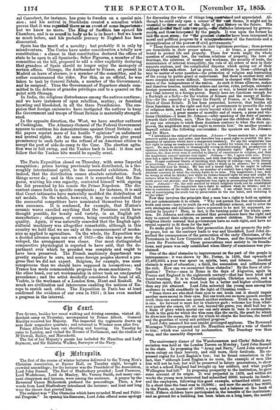The Paris Exposition closed on Thursday, with some Imperial recognition
; prizes having previously been distributed, in a tho- roughly international spirit, to the successful exhibitors. Not, indeed, that the distribution causes absolute satisfaction. Such things never do ; and in this case it is remarked that the Em- peror, waiving his own sagacity, contented himself with signing the list presented by his cousin the Prince Napoleon. The dis- content comes forth in specific complaints ; for instance, it is said that Court intimacies have materially modified the distribution of art medals. On the whole, however, it may be considered that the successful competitors have nominated themselves by their own successes. It is confessed, for example, that Minton's ceramic wares excelled anything that the Parisians could have thought possible, for beauty and variety, in an English art- manufacture ; cheapness, of course, being essentially an English quality. Again, it was naturally conceded that the English agri- cultural machinery was altogether remarkable, although in this country we hold that we are only at the commencement of mecha- nics as applied to agriculture. On the whole, the Exposition was a decided advance upon our own of 1851—the idea was more de- veloped, the arrangement was closer. Our most distinguished comparative physiologist is reported to have said, that the de- partment over which he presided was complete and ought to have been preserved. The French machinery department was greatly superior to ours, and some foreign peoples showed a pro- gress that we did not expect. Belgium, for example, was more conspicuous than we should have supposed in locomotives; and France has made commendable progress in steam-machinery. On the other hand, our art workmanship in silver took an unexpected
Ypecedence ; and the artist decidedly considered the head of all, echte, is the workman of a London firm, Hunt and Roskell. So much are civilization and intercourse enabling the nations of Eu- rope to enrich each other. The Exposition in Paris has at least confirmed the evidence of our own in 1851; it has even marked a progress in the interval.


































 Previous page
Previous page